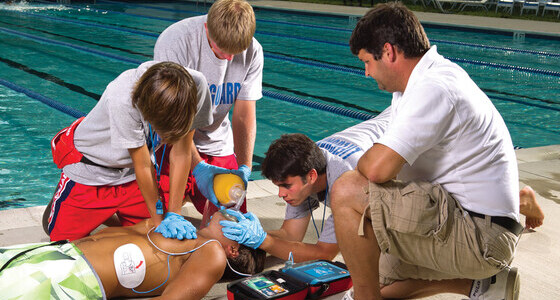For Julie Lycksell, a wife, a mother and retired operating room nurse from Long Island, NY, Feb. 6, 1998, is a date she will never forget.
On that day, only two days after her actual birthday, Julie celebrates her “re-birthday” — marking the day she nearly died from sudden cardiac arrest (SCA).
Luckily, when Julie experienced SCA and lost consciousness at a local restaurant, she benefited from having the right people with the right equipment help her at just the right time. From the doctor and nurse dining near Julie who performed CPR, to the police officer who used an automated external defibrillator (AED) to shock her heart back into rhythm, Julie is here today because of their quick action. At the hospital, doctors inserted an implantable cardioverter defibrillator (ICD) in her chest to prevent future life-threatening heart events. ICDs have given Julie the gift of more than 20 extra years of life following that fateful episode.
Julie’s story sounds remarkable because it is. If not treated immediately, SCA can be fatal. Approximately 95% of people who experience an out-of-hospital cardiac arrest event and are not treated by defibrillation within 10 minutes will die.
What Is Sudden Cardiac Arrest?
SCA is a condition in which the heart suddenly and unexpectedly stops beating. Unlike other heart conditions, SCA can impact people off all ages, races and ethnicities, and often with no warning — in fact, 1,000 people each day experience SCA. Different from a heart attack, SCA is an electrical issue that stops the heart, leading to lack of blood flow to the body. Cardiac arrest remains a public health crisis, claiming more lives than breast cancer, AIDS and lung cancer combined.
Who is at Risk?
People who have had a heart attack, heart failure or a low ejection fraction, or people who previously experienced SCA or come from a family with a history of heart disease are at higher risk. If a family member experiences any of these events, it’s important to talk to a doctor about potential risk. In Julie’s case, several family members received an ICD to ensure their hearts beat properly and protect them should an abnormal heart rhythm strike.
Julie’s career as an OR nurse gave her a forum to offer firsthand advice about the lifesaving benefits of ICDs and the reassurance they can bring: “This is your insurance policy for your heart — it offers added protection … you are safer with this.”
How Does an ICD Work?
An ICD is a small device, the size of a pocket watch, placed under the skin below the collarbone, requiring a two-to-four-inch incision, with leads (thin wires) to monitor your heart rhythm 24 hours a day and deliver therapy if needed. Its battery lasts nearly a decade, as seen in Julie’s case. If the heart beats irregularly, the device sends low-energy electrical pulses to correct it. If the fast rate continues, the defibrillator will deliver a shock to restore the heart to a normal rate.
If you have experienced or are at risk for abnormal heart rhythms (arrhythmias) called ventricular tachycardia/ventricular fibrillation, you may be eligible for an ICD.




